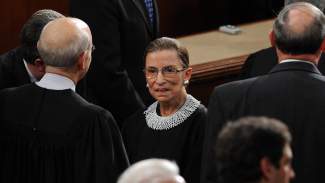As we see other nations allowing marriage for all, as we attend so many weddings this summer and in the coming years, we must remember that there are still those that feel SCOTUS's ruling was an error and will seek to have it overturned.
What hasn't happened is that we have not forgotten one of our best supporters out there, Supreme Court Justice Ruth Bader Ginsburg (RBG). It is great to see that she is still being vocal about Marriage Equality in the United States. Below, we have RBG's interview with SLATE.com's Mark Joseph Stern.
In a perfect world, Justice Ruth Bader Ginsburg would have written the opinion of the court in Obergefell v. Hodges, applying her comprehensive understanding of equality to strike down laws that prevent same-sex couples from marrying. But we do not live in a perfect world, and so Justice Anthony Kennedy—the most senior justice in the Obergefell majority—assigned the opinion to himself, penning a slightly mystifying encomium to the Constitution’s hazy guarantee of “liberty.”
Since Obergefell came down, Ginsburg has hinted that she would have written the decision differently, elaborating upon the equal protection issue at the core of the case. Now, in a wonderful chat with her old friend Gloria Steinem arranged by the New York Times’ Philip Galanes, Ginsburg has expanded upon this line of logic. After Steinem mentioned that the black civil rights movement and feminism were “profoundly connected,” Ginsburg noted that feminism and the marriage equality movement were connected, as well:
It’s a facet of the gay rights movement that people don’t think about enough. Why suddenly marriage equality? Because it wasn’t until 1981 that the court struck down Louisiana’s “head and master rule,” that the husband was head and master of the house. Marriage was a relationship between the dominant, breadwinning husband and the subordinate, child-rearing wife. What lesbian or gay man would want that?
Ginsburg made a similar point about this case, called Kirchberg v. Feenstra, during Obergefell oral arguments. Michigan’s attorney had just argued that the definition of marriage as one man and one woman had existed “for millennia.” Ginsburg seemed agitated. “We have changed our idea about marriage,” she told him:
Marriage today is not what it was under the common law tradition, under the civil law tradition. Marriage was a relationship of a dominant male to a subordinate female. That ended as a result of this court’s decision in 1982 when Louisiana’s Head and Master Rule was struck down. And no state was allowed to have such a marriage anymore. Would that be a choice that a state should be allowed to have?
It’s clear that, for Ginsburg, Kirchberg is a key precedent to Obergefell, one that creates a direct link between the feminist fight against Head and Master laws and the LGBTQ fight against gay marriage bans. Both battles focused on making marriage itself a more egalitarian institution, one free from gender stereotypes and the irrational expectations of sexism. No single court case, of course, can erase societal prejudice on its own. But in both Kirchberg and Obergefell, the Supreme Court forbade states from imposing sexist beliefs—in Kirchberg, that women must be subservient to men; in Obergefell, that only people of different sexes can create a true marriage.
What is great is we have this support in the Supreme Court and she is not shy to talk about her beliefs, her knowledge, and her rulings.
What is not great is we may lose this support once she retires from her position. We will need to make sure a Democrat does take the White House for 4 more years and s/he appoints a great Justice.
Could we just get SNL's Kate McKinnon to take her place? No one would notice, right?
H.T Stale.com and Mark Joseph Stern, a writer for Slate. He covers the law and LGBTQ issues.



Kennedy’s Obergefell opinion cites Kirchberg only once, to demonstrate that the court has “invoked equal protection principles to invalidate laws imposing sex-based inequality on marriage.” The bulk of his opinion veered away from these “equal protection principles” toward the “liberty” of gays to “define and express their identity” through marriage. That’s a compelling rationale, no doubt, but it skims over the court’s rich history of enforcing the Constitution’s more direct command of equality. Ginsburg understands that the prologue to Obergefell was written by feminists—that, in many ways, marriage equality was the culmination of a process begun by the women’s rights movement long ago. In his Obergefell dissent, Chief Justice John Roberts accused the majority of “overlook[ing] our country’s entire history and tradition.” But it was Roberts, not the court, who overlooked America’s “history and tradition” of striving toward an ever more inclusive vision of equality. – slate.com